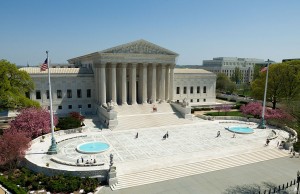 As a result of yesterday’s landmark Supreme Court ruling involving Hobby Lobby and Conestoga Wood, a lot of incorrect information has emerged across the Internet. We want to take a moment to bust a few common myths we see recurring about the ruling and its implications.
As a result of yesterday’s landmark Supreme Court ruling involving Hobby Lobby and Conestoga Wood, a lot of incorrect information has emerged across the Internet. We want to take a moment to bust a few common myths we see recurring about the ruling and its implications.
- Myth #1: The ruling struck down the HHS contraceptive mandate. Believe it or not, the HHS mandate still stands; it just doesn’t apply to certain family-owned businesses. Yesterday’s ruling found that family-owned businesses whose owners have well-established, deeply-held religious convictions guiding their practices cannot be forced to pay for contraceptives, abortifacients, sterilizations, or other services they find objectionable. Other for-profit companies still have to abide by it.
- Myth #2: The ruling means Hobby Lobby and other companies won’t offer health insurance to their employees. Yesterday’s ruling has nothing to do with the availability of health insurance. According to our research, Hobby Lobby offered health insurance to its employees before Obamacare went into effect. Hobby Lobby plans to continue offering health insurance to its employees today. The issue has never been whether or not Hobby Lobby would offer insurance to employees; the issue has always been whether or not the federal government can require those insurance plans include procedures and services Hobby Lobby’s owners find morally objectionable.
- Myth #3: The ruling allows corporations to discriminate against women. Yesterday’s ruling doesn’t allow anyone to “discriminate.” All it said was family-owned businesses affected by Obamacare cannot be forced to pay for services and procedures the owners find morally objectionable. Good, bad, or indifferent, these businesses still have to provide insurance plans under Obamacare; they just don’t have to include things like contraception, sterilization, and abortion-inducing drugs if the owners have a deeply-held religious conviction against those services.
- Myth #4: Companies are going to stop paying for contraceptives. Obviously, some companies–like Hobby Lobby and Conestoga Wood, the plaintiffs in yesterday’s ruling–will not be paying for employees’ contraceptives and abortion-inducing drugs. At the end of the day, however, the lawsuit and the ruling were about giving companies options. Publicly traded companies still have to pay for contraception and abortifacients; many family-owned companies probably will offer insurance plans that include contraception; some family-owned companies will offer plans that don’t include those services. The ruling simply says the federal government cannot force family-owned companies like Hobby Lobby to pay for things they find morally objectionable. It’s left to the discretion of the company’s owners. Hobby Lobby gets to offer insurance plans to their employees without worrying about whether or not anything included in those plans is morally objectionable.
- Myth #5: The ruling will allow Walmart and other major corporations to start claiming religious liberties. Yesterday’s ruling is narrowly-tailored, affecting only closely held companies (e.g. family businesses) whose owners try to do business according to their deeply-held religious convictions. Walmart and other major corporations are not “closely held.” They are publicly traded with literally thousands of people owning shares of the company. What’s more, the founders and managers of many of the nation’s leading corporations have never asserted they are running their businesses according to any religious convictions. A deeply-held religious conviction is not something a company can decide to invoke on a whim. Any time a person raises the issue of religious liberty in a lawsuit, the government looks for longstanding evidence that the person’s religious beliefs are genuine and deeply-held. In light of all this, it would be difficult for any company to suddenly start claiming it now operates according to the owners’ deeply-held religious beliefs, let alone a major, publicly traded corporation.
- Myth #6: The ruling will keep women from accessing contraceptives. Before the HHS mandate was promulgated a few years ago, companies like Hobby Lobby had leeway in the kinds of insurance plans they offered employees. Those insurance plans could include contraceptives or they could not. It was up to the company. Companies couldn’t fire employees for using contraceptives; people were free to buy contraceptives the same way they are free to buy anything else. Very little has changed, in that regard, in light of yesterday’s ruling. If you work for a family-owned business whose owners have a religious objection to paying for your contraceptives, you’re still free to go to the drugstore and buy contraceptives. Again, this issue has never been about whether or not people can buy contraceptives, but whether or not people can be forced to pay for those things against their deeply-held religious convictions.
Bishop Anthony Taylor of the Catholic Diocese of Little Rock once said government should not require what conscience forbids or forbid what conscience requires. Yesterday’s ruling is a step in that direction. It doesn’t coerce people into paying for something their conscience finds objectionable; it doesn’t prevent people from purchasing something with their own money. The ruling does not spell doom and gloom or legalize discrimination the way many are trying to claim. It simply keeps the federal government from running roughshod over the religious liberties of families who own businesses.

